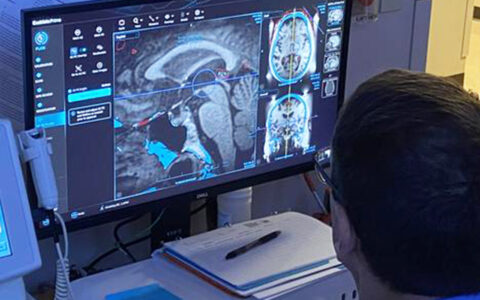The New IDEAS (Imaging Dementia-Evidence for Amyloid Screening) study has begun, to test the findings of the Original IDEAS investigation among Black, Latinx, and other minority patient populations. IDEAS had found that using amyloid PET scans to diagnose patients with Alzheimer’s disease (AD) and other dementias increased diagnostic accuracy and altered care, increasing medication use, and possibly improving outcomes – but 88 percent of its patient population was non-Hispanic whites.
“There are serious concerns that PET tests may not perform equally well in racial and ethnic minorities, patient groups at especially high risk for AD which were underrepresented in the first study,” said Consuelo H. Wilkins, M.D., a professor of medicine at Vanderbilt University Medical Center. One of the few geriatricians elected to the National Academy of Medicine, she will serve as the principal investigator in charge of recruitment for New IDEAS.
The study will enroll a total of 7,000 people with cognitive impairment over 30 months, at sites throughout the U.S. Participants will include 2,000 Black and 2,000 Latinx people, and 3,000 people from other ethnic and racial backgrounds.
“There are serious concerns that PET tests may not perform equally well in racial and ethnic minorities, patient groups at especially high risk for AD.”
Addressing Alarming Trends
Age is the biggest risk factor for AD, and older adults are the fastest growing demographic in the U.S. In 35 years, one-third of the U.S. population over age 85 will be Latinx/Hispanic, Black or from another ethnic or racial minority groups and if trends persist, more than half of these individuals will suffer from a dementia, Wilkins said.
Black people also suffer disproportionately high rates of hypertension and diabetes, both of which are risk factors for AD.
“We need to understand and address not only Alzheimer’s in general but these disparities more specifically, to avoid seeing our health care system overwhelmed, not to mention the devastation for individuals and families,” Wilkins said. She has long focused on improving research to address the most pressing needs of older members of underserved communities.
Three Main Aims
The New IDEAS participants will all have Medicare as their primary health insurance; will be evaluated by dementia specialists; and will either meet the criteria for mild cognitive impairment (MCI) or dementia, as well as meeting criteria for “clinically typical” or “clinically atypical” Alzheimer’s disease.
“We need to understand and address not only Alzheimer’s in general but these disparities more specifically, to avoid seeing our health care system overwhelmed.”
The study has three main aims. First, it will compare health outcomes in amyloid PET-positive versus amyloid PET-negative participants. Second, it will describe the association of amyloid PET findings with changes in patient management and health outcomes among Black, Latinx and Caucasian people who present with MCI and dementia.
Third, it will describe the association of amyloid PET findings with changes in patient management and health outcomes of patients who present with clinically typical Alzheimer’s symptoms, which are predominantly memory loss, versus patients who present with less common symptoms such as difficulty processing information or sudden onset.
The study will also amass materials for future research into cognitive impairment-related biomarkers. “We’ll be collecting plasma and DNA from patients who agree and storing the samples for future use identifying genetic and blood biomarkers for brain amyloidosis,” Wilkins said. Patients will also have the option of contributing their PET scans to a research archive.
Capturing Social Determinants Data
Wilkins discussed the varying life experiences of people, like her own mother, who grew up in impoverished rural settings and had their education interrupted so they could work in the fields. “People who missed so much school, or who don’t speak English as a first language … there is much we don’t know about them, and we fail to consider this in our studies,” she said. At the same time, the primary measures for cognitive impairment are memory tests which can be biased, Wilkins explained, and were not created with people who had diverse social experiences and schooling in mind.
“We don’t understand the effects of systemic racism and discrimination, and we need to do much better at asking the right questions.”
Researchers need to be more thoughtful and go deeper in their efforts to capture key data about social determinants of health in older age groups, Wilkins stressed. “If an older adult faced racism at school and all through their life that would surely impact their health, she added. “We don’t understand the effects of systemic racism and discrimination, and we need to do much better at asking the right questions.”





